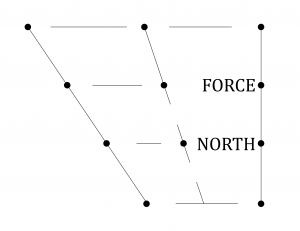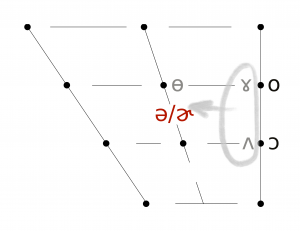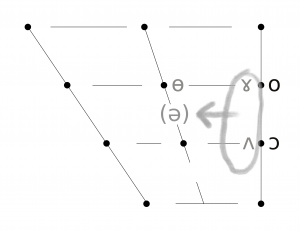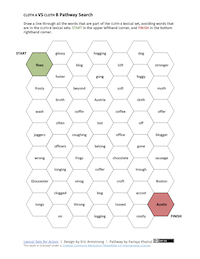23 The FORCE Lexical Set
The force lexical set is one of the harder ones to get your head around, as it is paired with north, and a relatively small number of accents retain a contrast between the two. Examples of the north–force sets include horse–hoarse, for–four, war–wore. When an accent has this north–force merger, the items in force are spoken with the north sound, which is essentially the vowel in thought. When an accent distinguishes between the two sets, force is pronounced with a more close articulation, generally in the range of /or/, while north is pronounced with a more open one in the range of /ɔr/. I’ve always found this difficult to remember, but perhaps this might help:
Oh, force is so forcefully close!
Aw, north is openly awesome, so drop your jaw!
I also think that it’s ironic that, on the vowel chart, north is “south” of force.

force has two ways of being pronounced, depending on whether it’s used in a rhotic accent or in a non-rhotic accent. In a non-rhotic accent such as those heard in the south of Wales, the West Midlands in England, India, the Caribbean or parts of the American South, in Boston and parts of Maine, force words feature the stressed vowel “oh,” or /o/. In very rare instances, non-rhotic force has schwa as an off-glide, e.g.[oə̯]. In a rhotic accent, such as those heard in some African-American accents and St. Louis, and in parts of the South, as well as in Scotland and parts of Ireland, force features the stressed vowel “or,” or /or/. This book uses the standard phonetic notation of centring diphthongs offgliding from a nucleus on the periphery of the vowel space, in this case something in the range of [ɔ~o], moving toward a non-syllabic r-colored central vowel [ɚ̯~ɘ̯˞]. There are also accents of English that feature rhoticity with little or no off-glide, where the nucleus itself is rhotic, [ɔ˞ ~ o˞]. The vowel in force is Free, so it can be in words with no consonant following it, apart from the silent/vowel ‹r› in its spelling: oar=ore, boar=bore, door, four. The force Lexical Set only contains words with this vowel/diphthong followed by ‹r›; for those words without ‹r› in their spellinɡ, see goat.


Wells, who first defined the Lexical Sets, set out three subgroups for force:
- force Ⓐ in free position, and derivative words (e.g. roar, roared, roaring)
- force Ⓑ in checked position, with a following consonant (e.g. port, ford, torn)
- Ⓑ1: is thought with a pure vowel in old-fashioned RP, [ɔ] (e.g. borne)
- Ⓑ2: is thought with an off-glide in old-fashioned RP [ɔə̯] (e.g. board). Note that the off-glide in RP is related to its historic relationship to its spelling: with the ‹ourC› and ‹oarC› spellings the letter after ‹o› is a hint that it can take an off-glide. Also note how this is different from the multi-letter versions of force Ⓐ, that lack a consonant after the ‹r›, which do not take an off-glide.
- force Ⓒ with intervocalic /r/ following (e.g. choral, oral)
n.b. In RP, cloth Ⓒ is merged with force Ⓒ & thought: [ɔ] (e.g. coral=choral), while north Ⓒ is distinct, merged with lot: [ɒ] (e.g. aural). In other accents this might not be so.
- 🕊 Free: does not require a following consonant, and can exist on its own
- in stressed and unstressed syllables
Spellings
| forceⒶ: | ore#, oar#, oor#, our# (compare northⒶ: or#, ar#) |
adore, more, boar, oar, door, floor, your, four, pour |
| forceⒷ1: | orC (forceⒷ1 same as northⒷ) |
afford, pork, porch, forge, sworn, forth |
| forceⒷ2: | oarC, ourC (compare northⒷ: quar#, war#) |
court, board, mourn*, fourth |
| forceⒸ: | orV, oarV (compare north Ⓒ: aurV) |
oral, adorable, auditorium, editorial |
There is no simple way to know force from north, especially force Ⓑ.
- Most force Ⓐ words are readily identified by spelling, with ‹ore› as in bore, more, core, as well as ‹oar, oor, our› as in boar, floor, four.
- All of force Ⓑ1 are ‹orC› as in port, fort, torn, but so are most north Ⓑ, as in porn, fork, torque, so that’s no help—you’ll need to look things up;
- force Ⓑ2 are ‹oarC, ourC›, so there’s no conflict with north Ⓑ there.
- force Ⓒ is either ‹orV› or ‹oarV› as in oral, floral, torus; north Ⓒ with ‹aurV› as in aural, Laurel, Taurus isn’t in conflict here, but cloth Ⓒ is in conflict with force Ⓒ, as many cloth Ⓒ words are also ‹orV›, as in orator, florid, historical.
| force Ⓒ | north Ⓒ | cloth Ⓒ |
| oral | aural | orator |
| floral | Laurel | florid |
| Torus | Taurus | historical |
If north and force are distinct, you have to figure out whether cloth is merged with lot or thought, which will tell you whether cloth Ⓒ goes with north (which is merged with lot) or force (which is merged with thought).
Pronunciations
Assuming that force isn’t merged with north, the force lexical set’s vowel in the non-rhotic version, and the nucleus of the diphthong in the rhotic version, is often pronounced with a mid-close back vowel, usually completely rounded. Realizations in non-rhotic accents are in the range of [ɔ~o̞~o]; rhotic force is realized as [ɔɚ̯ ~ oɚ̯]. All of these realizations assume that force is more close than north, which is more open.
Personal Pronunciation: Preparation
We’ll begin our investigation of your Personal Pronunciation of force by answering the question of whether you have a rhotic or non-rhotic accent. When a word has ‹r› in its spelling after a vowel, do you pronounce it? For a rhotic speaker, words like beer, bare=bear, boor, boar, bar will have an /r/ sound after the vowel; a non-rhotic speaker will not. If you are a non-rhotic speaker, try saying force with an /r/ sound; if you are a rhotic speaker, give force a try without one. Go for it: more, bore, lore, core! Now, experiment on your own with an audio recorder, or with a classmate, friend, coach or teacher to identify how force in your speech compares with force in others’ speech.
- For the non-rhotic version, ask whether your vowel is a monophthong, a single action, or whether it has any movement to it—does your tongue move as you make the vowel—making it a diphthong? Though it is less likely that it does for a non-rhotic speaker, if you did notice a slight off-glide, where does it off-glide to? (For example, it might off-glide to schwa [ə]; try on words like board, course.) If you don’t have an off-glide, then all you have is a nucleus!
- For the rhotic version, explore the nucleus of the sound before you off-glide into the r-colored coda of the diphthong. For some speakers, there is a significant shift from the nucleus where the force diphthong begins, and where the diphthong ends after the off-glide. For others with quite strong r-coloring, the rhotic quality is added to the nucleus. Rather than becoming r-colored over time, these speakers begin rhotic and may either stay there, or increase their r-coloring (rhoticity). If you start out being rhotic, then we would transcribe your force vowel with a rhotic diacritic right on the nucleus, e.g. [o˞] or [ɔ˞]. You can add multiple “wings” to indicate more rhoticity if you would like, e.g. [o˞˞˞]. Though it’s not “strictly-ipa-ballroom,” it’s fun and it works.
Before we begin with the nucleus of your force vowel, try to ascertain whether your version of it is merged with north. Compare these force/north minimal pairs to see if they match:
| force | north |
| oral | aural |
| boarder | border |
| borne | born |
| cored | cord=chord |
| fore=four | for |
| hoarse | horse |
| mourn* | morn |
| oar=ore | or |
| wore | war |
| worn | warn |
If they match: you have the north–force merger, and so the challenge for you is to explore trying out a new pronunciation. Generally, I find that those with a rhotic accent and this merger tend to need to explore opening up north words, and it can even help to try them with a non-rhotic accent first to see if that helps. Meanwhile, speakers with a non-rhotic accent and this merger may need to explore both closing force words towards [o] and opening north words towards [ɒ] in order to get enough of a contrast between the two.
If they don’t match: you don’t have the north–force merger, and so you’re blessed with the instinctual ability to distinguish between the two sets. In your explorations, you’ll want to be clear when and how you do it, and try to notice if any of the words listed here and on the north pages don’t match your expectations. Just because a word is listed here, doesn’t mean your idiolect, or the accent you speak, has it in the same groups. As accents and language are always on the move, always changing, you may well be halfway through the process of a merger or a split, and so words haven’t “settled” yet into sets.
Personal Pronunciation: Articulation Options
Try lengthening the sound of your force nucleus, and then attempt to subtly move it around within the vowel space—up, forwards, down, and back—in tiny increments. Each tiny move should make a subtle difference in the sound of your vowel. As it is a mid-open to mid-close vowel in many accents, as you experiment you should feel the top surface of the back of your tongue moving delicately up and down—towards/away from your soft palate and uvula—making more or less space in the back of your mouth. For many speakers, force has a lot of lip rounding, though some find they have very little—try doing force with both very little and with a lot. Compare the nucleus force with goat, thought, or lot, and see how great the contrast is between the vowels.
Rhoticity Scale: Now that you’ve explored the nucleus, let’s investigate the coda, and think about how much r-coloring, or rhoticity, you’ve been adding. (If you are non-rhotic and don’t have an off-glide, ask yourself how rhotic can you make it? How little rhoticity can you add without it having none? Can you make several shades of r-coloring: none, a tiny bit, a little, some, quite a lot, a ton? Think of it as a scale from 0–5. Where does yours sit? You would transcribe an off-glide to an r-colored schwa following the nucleus with a rhoticity “wing” diacritic, e.g. [ɑɚ̯].
For my own usage, I’ve tried adding a superscript number after a rhotic diacritic to rank the r-ishness on that 0-5 scale, with 0 being none and 5 as much as you can, e.g. [ɒɘ̯˞3] for a medium amount of r-quality.
Transcribing force: Decide which vowel/diphthong symbol best suits your force Lexical Set. Is it more close [o̝], mid-close [o], a more open o [o̞]; or is it more in the range of [ɔ̝ ~ ɔ ~ ɔ̞] or even [ɒ̝ ~ ɒ ~ ɒ̞]?
If your force vowel (or its nucleus) is… (use whichever vowel symbol is appropriate for you)
- high, use the raised diacritic [ ɔ̝ ], a small T pointing up
- open, use the lowered diacritic [ ɔ̞ ], a small T pointing down
- pushed forward, use the advanced diacritic [ ɔ̟ ], a tiny plus sign +
- pulled back, use the retracted diacritic [ ɔ̠ ], a tiny minus sign –
- if you add lip-rounding, use the more rounded diacritic [ ɔ̹ ], a tiny ɔ, which represents the lips rounding/projecting forward (to the left),
- if you have little lip-rounding, especially on a symbol assumed to be rounded like [ɒ, ɔ, o], us the less rounded diacritic [ ɔ̜ ], a tiny c, which represents the lips relaxing/moving back (to the right).
- if you have no lip-rounding, i.e. your lips are spread, you might use the unrounded equivalent symbols that match the traditional rounded ones. If you have completely unrounded [o], then you might use [ɤ], and if your lips are actually spread, you could use the double-ended arrow diacritic for “lip spreading”: [ɤ͍]. The unrounded equivalent for [ɔ] is [ʌ̠]. Note that I use the minus sign diacritic for “retracted” as ʌ has traditionally been associated with an open-mid central vowel roughly equivalent to [ɐ]. The sound we’re going for is fully back!
If you have a rhotic force diphthong, your coda might be
- close-mid central, so use an r-colored reversed-e, [ ɘ˞ ]
- mid central, so use an r-colored (or “flying”) schwa [ ɚ ]
- open-mid central, so use an r-colored turned epsilon (or “flying three”), [ ɝ ]
Alternate Pronunciations
KEY: When exploring the nucleus of a diphthong, ◌̯ is used as a placeholder for the offglide, [ ɘ̯˞, ɚ̯, ɝ̯ ] or [ɘ̯, ə̯, ɜ̯, ɐ̯]. To experiment with an accent without an offglide, as many non-rhotic accents do, ignore the ◌̯ altogether.
Experiment with the force Word Lists, Phrases and Sentences with the following vowel/nucleus options:
Rhotic nucleus: Also experiment with adding r-coloring to the nucleus (i.e. not to the end of the diphthong, but to its beginning) from none to as much as you can make, e.g. [ɑ̟ɚ̯, ɑ̟˞1ɚ̯, ɑ̟˞2ɚ̯, ɑ̟˞3ɚ̯, ɑ̟˞4ɚ̯, ɑ̟˞5]. Note that as you add rhoticity to the nucleus the bunching and/or curling action of the tongue means that the off-glide also becomes more rhotic. At the most extreme levels, there is so much bunching/curling on the nucleus that there really is no room to move towards the off-glide.
Off-glide:
KEY: When exploring the off-glide of a diphthong, ⬚ is used as a placeholder for the nucleus, such as [u̠, u̟, ʊ̜̽, ʉ, ɵ, o].
Now experiment with diphthongs that have a purely non-rhotic nucleus, and off-glides that range from least open to most open [ ⬚ɘ̯˞, ⬚ɚ̯, ⬚ɝ̯ ], and/or from no r-coloring, to as much r-coloring as you can make, e.g. [ ⬚ɘ̯, ⬚ɘ̯˞1, ⬚ɘ̯˞2, ⬚ɘ̯˞3, ⬚ɘ̯˞4, ⬚ɘ̯˞5]. Jump around, trying to mix and match: [oɘ̯˞5, ɔ̝ɝ̯1, ɤə̯, o, ʌ̠ɚ̯3, ɔ˞2].
As you move the vowels in the directions recommended, see whether that modified oral posture might inspire you to move the articulation of consonants and other vowels in the word in similar ways. Does it remind you of an accent other than your own?
I am indebted to John Wells’ original list of force words, and to Jeremy Sortore’s list, available online: https://voiceandspeech.site/speech-accents/accents/lexical-sets/north-force-reference-list/⧉
Word List, followed by a pause, or by a suffix
KEY: ◾︎force in stressed syllable
Word Lists for force, sorted by the consonant that follows
KEY: ◾︎force in stressed syllable
PLOSIVES
-p
-b
-t
-d
-k
-ɡ
AFFRICATES
-tʃ
-dʒ
NASALS
-m
-n
-ŋ
FRICATIVES
-θ
-ð
-f
-v
-s
-z
-ʃ
-ʒ
APPROXIMANTS
force before /rV/ is Wells’ Group Ⓒ, with force before consonant /r/ going into a vowel. Rhotic speakers should explore:
- the rhotic diphthong version without a consonant /r/, e.g. oral [ˈo˞ɚ̯əɫ] or [ˈoɚ̯əɫ]; then
- a rhotic diphthong, with consonant /r/, [ˈoɚ̯ɹəɫ]
- and a non-rhotic diphthong, with consonant /r/, [ˈoə̯ɹəɫ], and finally
- a pure vowel followed by a consonant /r/, [ˈoɹəɫ].
Can you feel how fluid/abrupt these different options can make it seem: how can these different options serve you in different contexts?
-ɹ
-l/ɫ
-w
Short Phrases
- A tourist* in Singapore.
- The storeroom’s trap-door.
- The courtier’s sword.
- Exported pork.
- Sworn into the court.
- Deported from Borneo.
- A portrait of Roger Moore.
- Is snowboarding a sport?
- The notorious historian taught a course.
- They’re mourning* their divorce.
- Saru used the spore drive to restore the Federation.
- She laughed so uproariously she made herself hoarse.
- Dora ignored Norah’s snoring .
- Explore the shoreline .
- His notorious sartorial flair.

Sentences
Level 1
Short with 2-3 words, underlined
- Janitorial services for the auditorium aren’t affordable.
- Tory is hoarding seats and tables in the food court.
- Ford the river just south of the port before attacking the fortress.
- I could have sworn that Obi-wan said “Use the force, Luke,” in the fourth movie.
- The foreman tore out the carpet next-door.
Level 2
Short with 4-5 words, underlined
- The coarseness of the four-letter word was blown out of proportion during the court-martial.
- Furthermore the aforementioned “curatorial genius” was a total bore.
- The floorboards and supports of the porch were two-by-fours.
- I swore when I banged my sore forehead* against the top of the doorjamb.
- Furthermore, the fourth exported painting was actually forged, rather than restored.
Level 3
Medium with 3-4 words, not underlined
- A proportion of second partners are worn out by divorce.
- The porter with the clogged pores said room and board was included.
- Let’s sally forth and explore the golf course in our angora sweaters. Fore!
- The Gregorian Chant of Gloria was sung in the Victorian castle’s forecourt.
- I adored being on the board of the Association, and only wish I could afford to do more.
Level 4
Hard with The 4-6 words, not underlined
- They learned to cite their sources in the course on scoring choral arrangements.
- I implore you to reveal the source of the ore used for the silver boar statue.
- Linus laboriously imported the code over the course of four boring but important* days.
- They gorily defended the ring-shaped torus planet using their notoriously deadly laser swords.
- A pictorial and oral presentation on the Bruneian flora found on the north shore of Borneo.
Mergers
north–force Merger: Also known as the “horse-hoarse merger,” where force merges with north, as is found in much of the English speaking world. Accents which do not have the merger are found in Scotland, India, Ireland, the Caribbean, and in some accents of the US, including parts of the US South, Maine, and in some African American Englishes (See p. 4 for examples). If you have this merger, then try to differentiate the north and force words in the sentence below. If you do not have this merger, try to match them, using [ a, ɑ, ɒ, ɔ ] first as a non-rhotic vowel, or as the nucleus of a diphthong.
Experiment with differentiating north/force pairs such as: [ɑ/ɔ, a̠ɚ̯/ɒɚ̯, ɑ˞/oɘ̯˞, ɐ̞/o, ɒɚ̯/ɔɚ̯].
-
- The boarder who was hoarse rode his horse to the border to mourn for his mother this morning.
- The museum curator had to escort the newly imported and highly important Andy Warhol* portrait.
- There was no remorse for people caught using outside resources during the final exam of the Morse Code Course.
- Laura had to prepare for the notoriously difficult German oral and aural exam.
force–cure Merger: For much of the English speaking world, force and cure (which was traditionally [ʊə̯/ʊɚ]) are becoming merged. As cure is in a process of “lowering” (i.e. becoming more open), more words are shifting to be merged with force, as in poor, moor, your.
force–cure minimal pair/homophones can include: boar=bore/boor, gored/gourd, lore/lure, more/moor, pore=pour/poor, shore/sure, tore/tour, yore=your/you’re. (Note that the underlined options, in some accents, are merged with nurse rather than force.)
-
- The bored boor was sure he tore his shorts on the tour of the shore.
- You’re luring him on the trip with your lore about more Moors from days of yore.
- I always adore a good manicure and pedicure, but I can’t afford it anymore.
- The historian was extremely territorial and furious at the security guard who entered her office without her knowledge.
- After every successful sport tournament, I feel so much more self-assured, on and off the court.
Note that many cure words are in the process of merging with nurse instead of force, especially when it follows yod [j], or “historical yod” which is assimilated into the consonants [ʃ, ʒ, tʃ, dʒ, l, ɹ] as in pure, assure, azure, caesura, mature, injurious, alluring, rural.
north–force–nurse Merger: The broad Geordie accent has traditionally had a merger where nurse words are pronounced with the north–force (merged) vowel: the central vowel /ɜ/ shifted back due to the historical uvular /r/ [ʁ], which has since disappeared. Note that contemporary, more middle-class Geordie has reversed course, and moved nurse forward, into the range of a rounded front vowel, [ø̈]. north–force–nurse minimal pair/homophones include: for/fir, more/myrrh, short/shirt, war/were, four/fir, reˈcord,/recurred, former/firmer, ward/whirred, accord/occurred, assort/assert, boar/burr, board/bird.
- There was a commercial for an immersive haunted house in Warsaw that displayed their collection of artificial torsos.
- Osman journeyed far to return to where he was born, on the island of Borneo.
- The warden could not afford to be transferred to another facility if another altercation occurred.
goat–force–(north) Merger: In areas of the world where force (and north, if they are merged, though often they are not) is non-rhotic, and where goat is a monophthong, it is possible to have this merger, often with [o]. This is the case in Jamaican prestige varieties, as well as non-rhotic varieties in Guyana. While Wikipedia suggests that this (and includes thought in the merger, too) is a feature of some accents in the north of England, I have not been able to fact-check which ones.
If you have this merger, you can try two options for variety’s sake:
- keep goat as it is, mid-close and monophthongal, and open up force to mid-open [ɔ]
- keep force as it is, and try goat as a diphthong, [oʊ̯].
If you don’t have this merger, you can experiment with making the following homophones with [o] or [ɔ].
goat–force-(north) minimal pairs/homophones include so=sew/sore, moan/mourn, coat/court, potent/portent, hoed/hoard, poke/pork, poach/porch, tone/torn, potion/portion.
- As you poach the eggs on the porch, please poke the pork sausages, too!
- They drank the portion of the potent potion in response to the portent of the prophecy.
- There was a loud tone to signal a storm, but soon our camp was being blown and torn even though we secured it with stones!
- I had to sew my coat with my sore hand after I slipped and fell in the courtyard.
Splits
There are no known force splits.
Review
Pathway Puzzles
 Pathway Puzzles allow you to practice finding members of a lexical set. Choose the next cell with the FIRST lexical set word to make a pathway from the START of the puzzle down to the FINISH. Open the KEY document to see the solution, and check your work. Pathway Puzzles were created by Farisya Khairul, through support from a AMPD Minor Research Grant.
Pathway Puzzles allow you to practice finding members of a lexical set. Choose the next cell with the FIRST lexical set word to make a pathway from the START of the puzzle down to the FINISH. Open the KEY document to see the solution, and check your work. Pathway Puzzles were created by Farisya Khairul, through support from a AMPD Minor Research Grant.
Having /r/-colouring; may apply to a vowel, or to an accent that maintains historic /r/ "after" the vowel (i.e. in the spelling). The opposite of non-rhotic, which lacks /r/-colouring.
Lacking /r/-colouring in the vowel, or an accent that lacks historical /r/ "after" the vowel (esp. in the spelling). The opposite of "rhotic." "Rho" is the name for , the Greek letter that represents /r/.
The most prominent part of a diphthong. For most English diphthongs, it is the first part of the diphthong. Paired with a glide either an "onglide" into the nucleus, or an "offglide" out of it. Sometimes the term "coda" is used for the offglide.
The weak end of a falling diphthong, the offglide from the nucleus. Typically this is some variant of /ə/, /ɚ/, /ɪ/, or /ʊ/.

